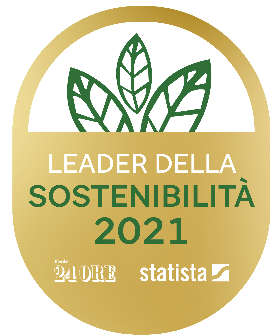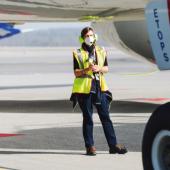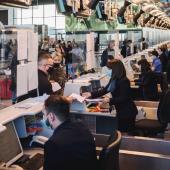
Letter

Letter to Stakeholders
It is not the strongest of the species that survives, nor the most intelligent; it is the one most adaptable to change.
CHARLES DARWIN
2020 witnessed the emergence of a clear paradox for both SEA and the air transport sector as a whole.
While dealing with the most severe crisis in its history following the COVID-19 pandemic and the government restrictions put in place to contain its spread, Europe’s aviation sector faced mounting pressure from community institutions to drastically accelerate its sustainability commitments, and its decarbonisation programme in particular. The sector was urged to accelerate the pace of its environmental and social commitments at a time when the financial sustainability of airports and other flight operators had never been so threatened.
The pandemic hit our industry hard - and more so than any other. In 2020, airports saw 1.32 billion passengers, 7 thousand European routes and 6 million movements fewer than the previous year, resulting in total net losses of Euro 33.6 billion.
Passenger numbers and flights at the Milan airports dropped by 75% and 60% respectively compared to 2019, generating financial losses of an unprecedented scale for SEA. Contingent damage was coupled with a serious concern for the sector’s recovery to pre-pandemic traffic levels, which is forecast to be lengthy (not less than three to four years) and which will involve a structural transformation that risks reducing profitability in the medium-to-long term.
The desire for a sustainable economic recovery expressed in the EU’s Green New Deal - especially in terms of carbon footprint reductions - shone a light on air traffic and was subsequently translated into dedicated transport policy guidelines through the Sustainable and Smart Mobility Strategy.
The EU’s road map of regulatory actions (the introduction of environmental excise duties on jet fuel, the required use of low-impact fuels, the removal of free carbon credits for aviation) - together with the European Investment Bank’s decision to halt funding for airport expansion projects - places air transport in a particularly difficult situation with regard to the changes that need to be made.
SEA has not, however, used its reduced ability to generate economic value as an excuse for inaction on the sustainability front. In fact, the past year has seen us formalise our approach - starting with a Sustainability Plan to complement our 2021 - 2025 Business Plan - and implement cross-departmental projects that actively involve stakeholders.
We felt that “teaming up” both in-house and with other players in the supply chain to implement a well-defined set of initiatives was the best way to pursue our ongoing commitment to ESG topics, given the financial instability that is likely to accompany us for some time.
We have insisted on the ongoing alignment of departmental initiatives, analysing the most effective and convenient ways to define them in terms of sustainability. We have also worked on partnership models with third parties inspired by the creation of “shared value”, which has allowed us to avoid suspending initiatives such as the airport’s migration to an electric vehicle fleet. In addition, we have been able to prevent the postponement of the circular economy projects due to be implemented at maintenance sites and to provide innovative space for manoeuvre, allowing us to come to a pioneering agreement with Ticino Park to protect biodiversity in the natural areas surrounding transport infrastructure.
The progress we have made has strengthened our belief that we must pursue a collective commitment to sustainability through this period of difficult economic recovery. We believe that the current situation provides us with an opportunity to finalise our transition to an ESG model, leaving behind the idea that companies must generate value for stakeholders and instead embracing a more comprehensive understanding of long-term value as the result of the generation of value by companies and their stakeholders.
After all, this “systematic” understanding of value is a natural consequence of the role played by airports in accelerating the performance of regional economic players, mitigating negative effects, and fostering collective resilience in critical situations such as the one we currently find ourselves in.
This was demonstrated by Malpensa airport, which played a crucial role in providing health care supplies to Italy during the lockdown (approx. 1 billion masks, 200 million hospital gowns and more than 2,500 critical care devices travelled through Cargo City) and in reactivating global production chains, allowing Northern Italy’s manufacturing sector to recover ground in terms of exports to more distant and dynamic markets. 2020 saw a decline of over 10% for Italian exports, while Malpensa continued to represent a crucial logistical structure for the main “Made in Italy” production chains, carrying 13% of exports in value terms for the furniture sector, 12.6% for fashion and approx. 7% for mechanics.
The European aviation industry is rapidly becoming aware of the need to join forces in response to the dual challenge of (economic-financial and socio-environmental) sustainability. In recent months, airports, airlines, handlers, and air navigation service providers have made an unprecedented effort to collectively rethink the sector from a sustainable perspective, focusing on reducing CO2 emissions, protecting and developing human capital, mitigating externalities (in terms of noise and biodiversity) and further improving safety measures for passengers and workers (with regard to their health in particular).
We unequivocally share these priorities, and this Non-Financial Statement describes the work we have done and are set to do on these topics, as well as in other areas included in our materiality profile.
For the second year, this document is divided into sections on the various types of capital we oversee to ensure our performance meets the expectations of our shareholders and stakeholders. This methodological framework seeks to underline the fact that financial capital is worthless without non-financial assets such as human, intellectual, social-relational, and natural capital.
Following the pandemic - which has drastically hindered our ability to generate financial capital, just as we are being urged to make a greater effort to support others - the challenge will be to overcome this paradox by making good use of our platform of non-financial services and by partially offsetting our limited budget.
We may not reach the goals we set ourselves in the time and manner we imagined a year ago.
But we can certainly say we made the best use of our time and approached our commitments wisely.
Chairperson
Michaela Castelli Chief Executive Officer Armando Brunini
Letter to Stakeholders
"For SEA, this drastic reduction in the capacity to generate economic value has been no excuse for inaction in terms of sustainability. In fact, never as in this past year have we begun to give greater structure to our approach."
Sustainability
SUSTAINABILITY VISION
We generate value that lasts over time
We want to continue pursuing the increasingly integrated management of economic, social and environmental sustainability, necessary for the evolution of our business model and the constant generation of value over time.
New materiality and commitment to the SDGs
In 2020 we carried out a thorough review of the materiality matrix, adopting the perspective of the 2030 Agenda promoted by the UN, identifying the potential positive impacts on Sustainable Development Goals.
New Code of Ethics
We have updated our Ethics System, focusing on the purpose, values and rules that distinguish us and the commitments made to our Stakeholders for sustainable, integrated and inclusive growth.
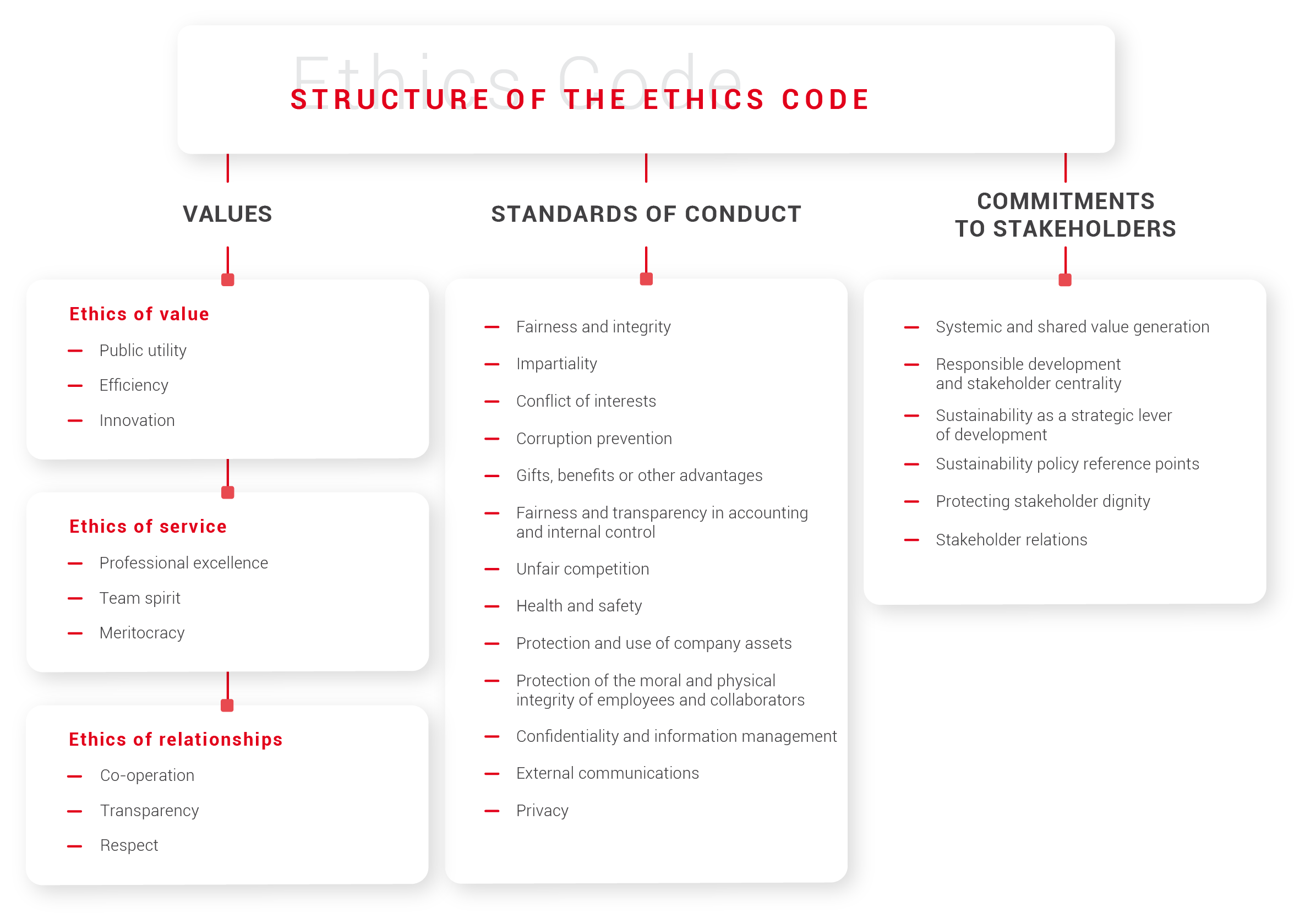

Stakeholders

SUSTAINABLE VALUE CREATION MODEL
Geared towards the territory
We consider our success in generating value for the company to be highly dependent on our ability to provide effective responses to the needs of the context in which we operate: we ensure accessibility and connectivity on a global scale and act as catalysts for the local and national social and economic fabric.
OUR SUSTAINABLE VALUE CREATION MODEL
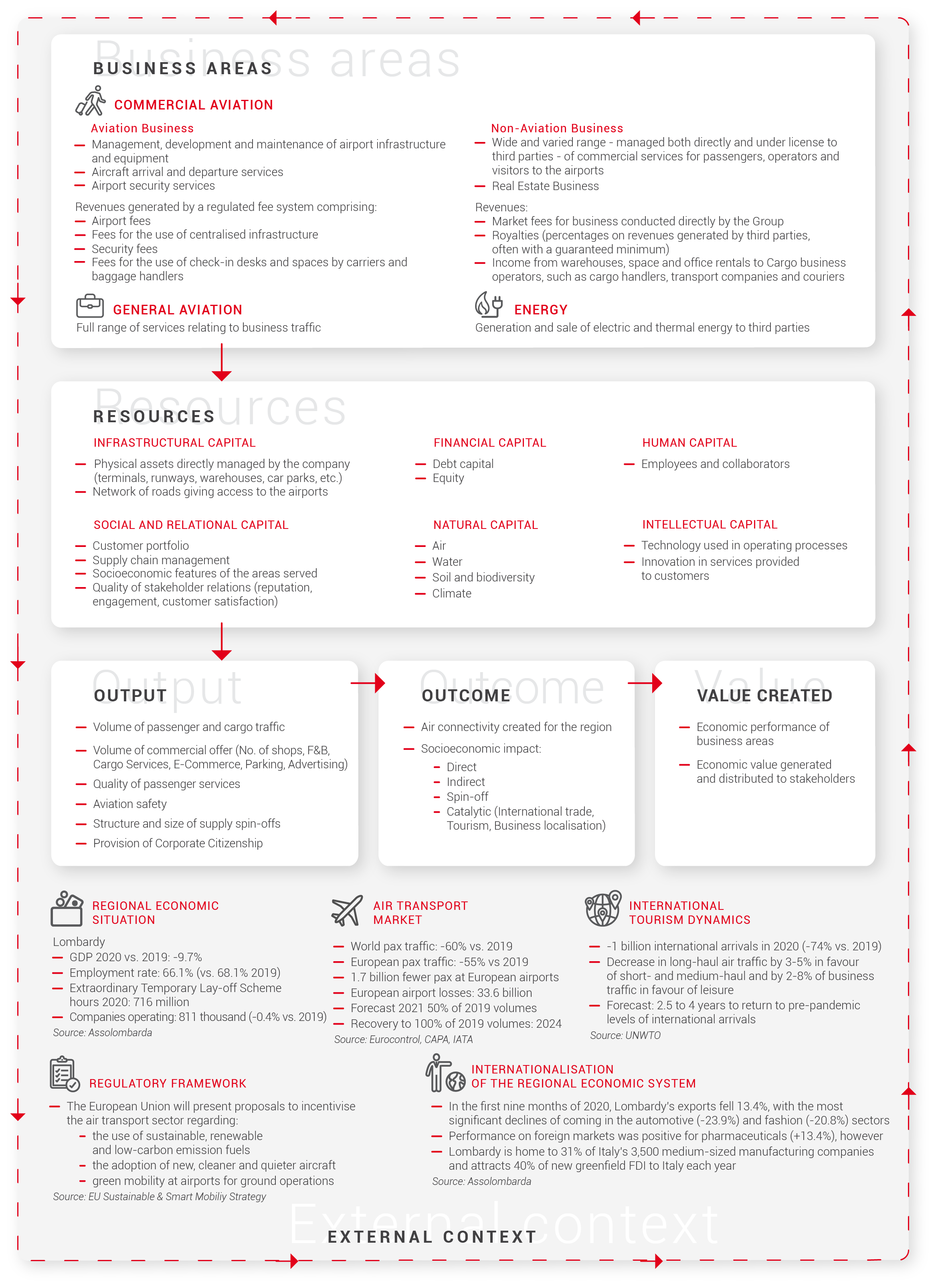
People
PEOPLE
Resilient workforce
A high level of digitisation and the use of ICT tools have allowed us to easily extend remote working to 90% of the compatible workforce.

Promuoviamo un piano indirizzato ai giovani per favorire e implementare il rinnovamento generazionale e apportare nuove competenze.
Nel 2020 abbiamo conseguito la Certificazione Triennale “Family Audit”, sinonimo del nostro impegno verso la tutela della salute e del benessere nostre persone.
TALENT MANAGEMENT
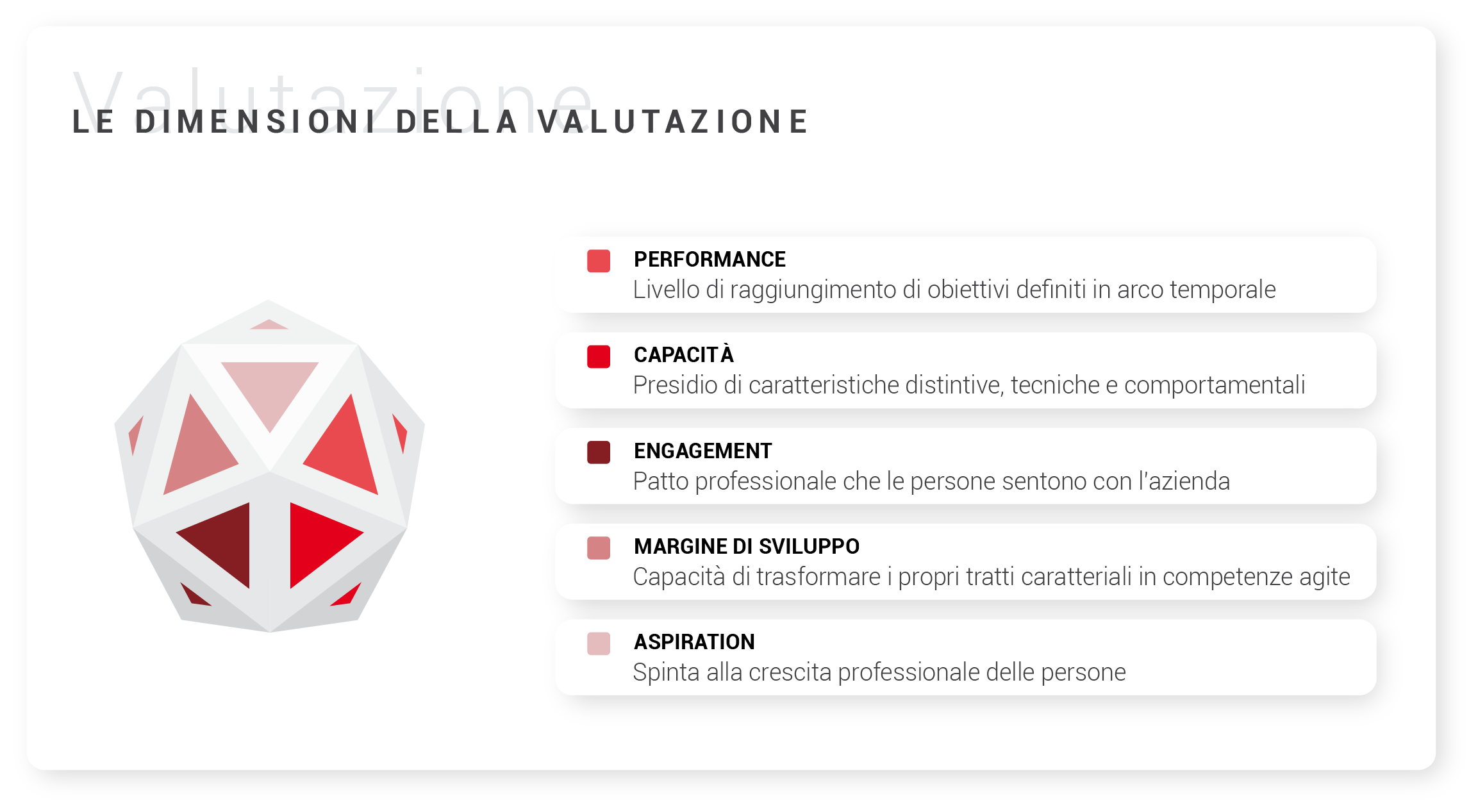
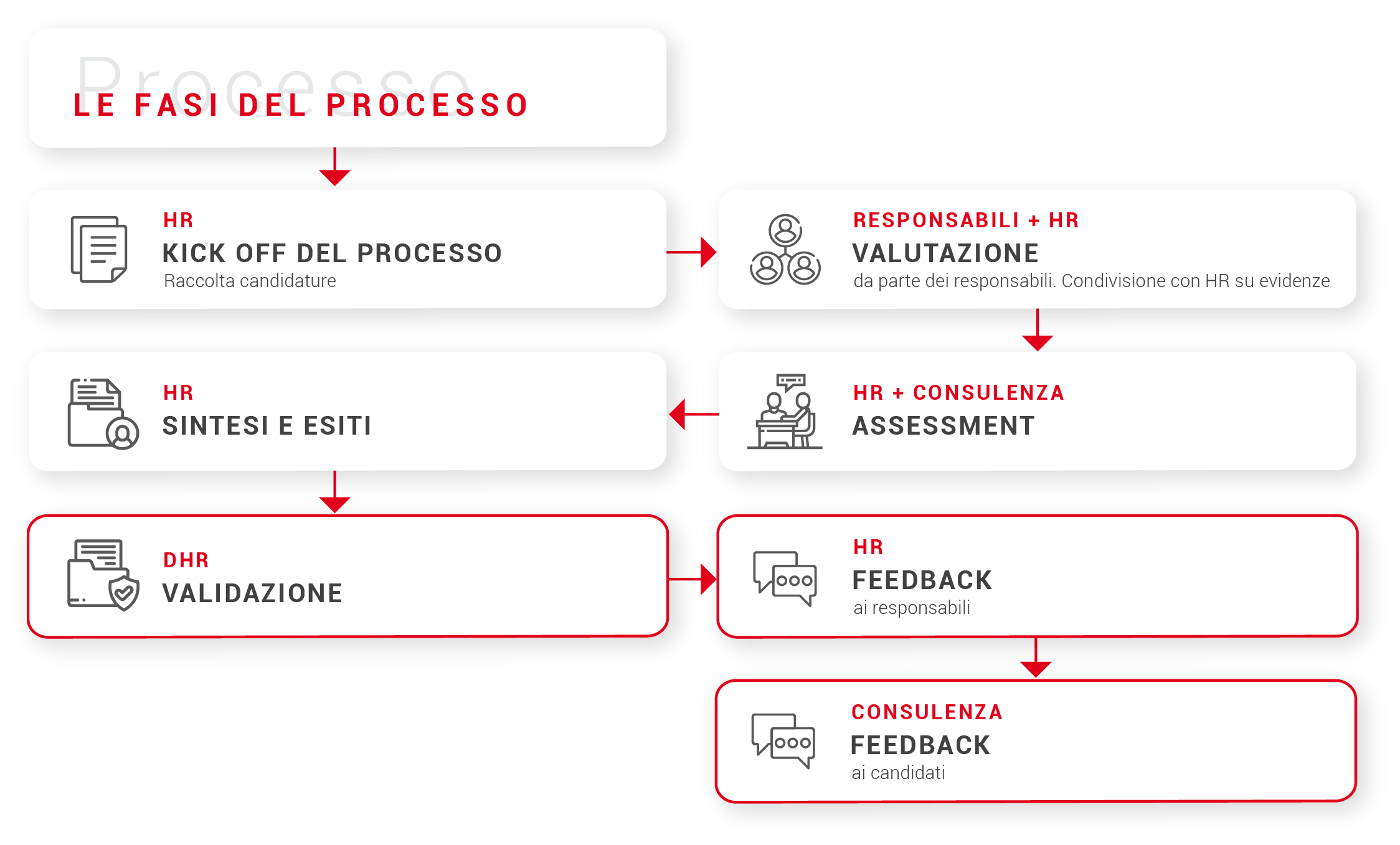
CONCILIAZIONE: FAMILY AUDIT
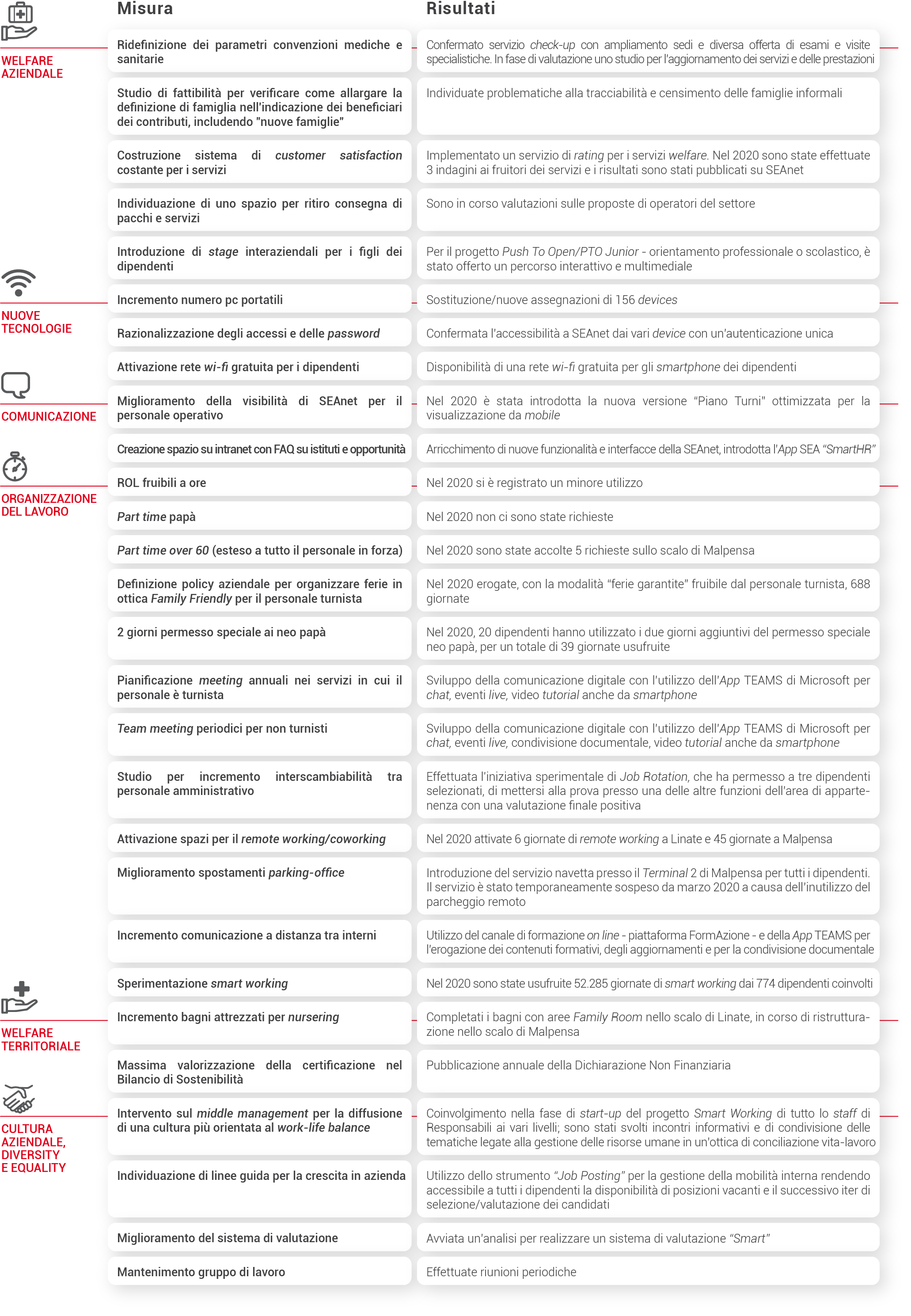
Environment
ENVIRONMENT
Goal: decarbonisation and circularity
In 2020, we confirmed our European leadership in the “3+ neutrality” group for both Linate and Malpensa airports. Since June 2019, we have participated in the “NetZero2050” initiative promoted by ACI Europe to achieve net zero CO2 emissions by 2050.
Scope 1, 2 and 3 CO2 emissions at our airports
We are working to minimise the environmental impact of waste and to encourage reuse and recycling with a strong impetus on separate waste collection at our airports.
Development of recycling at Linate and Malpensa
breakdown of sea spa co2 emissions into scope 1, 2 and 3 (% of total emissions)
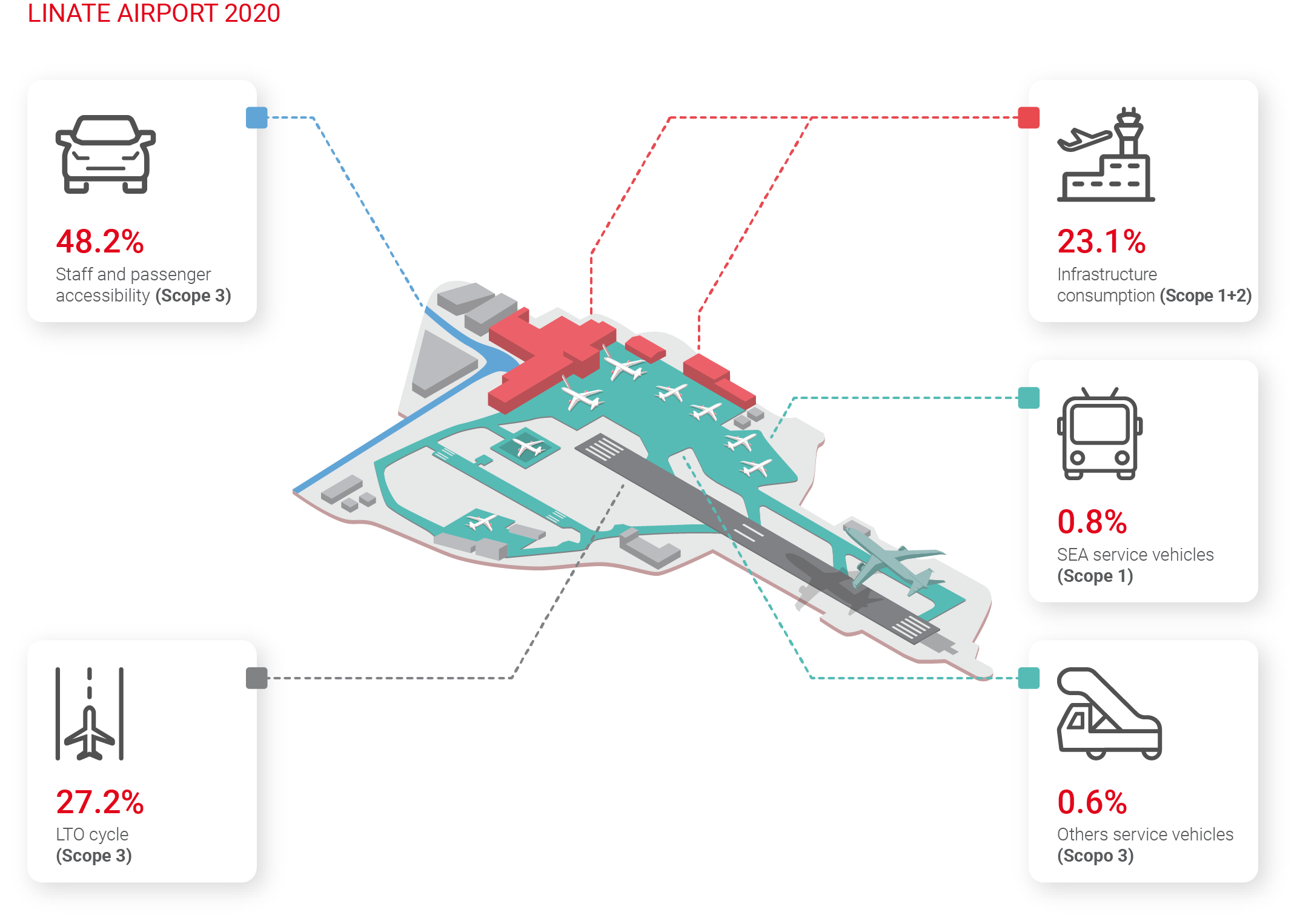
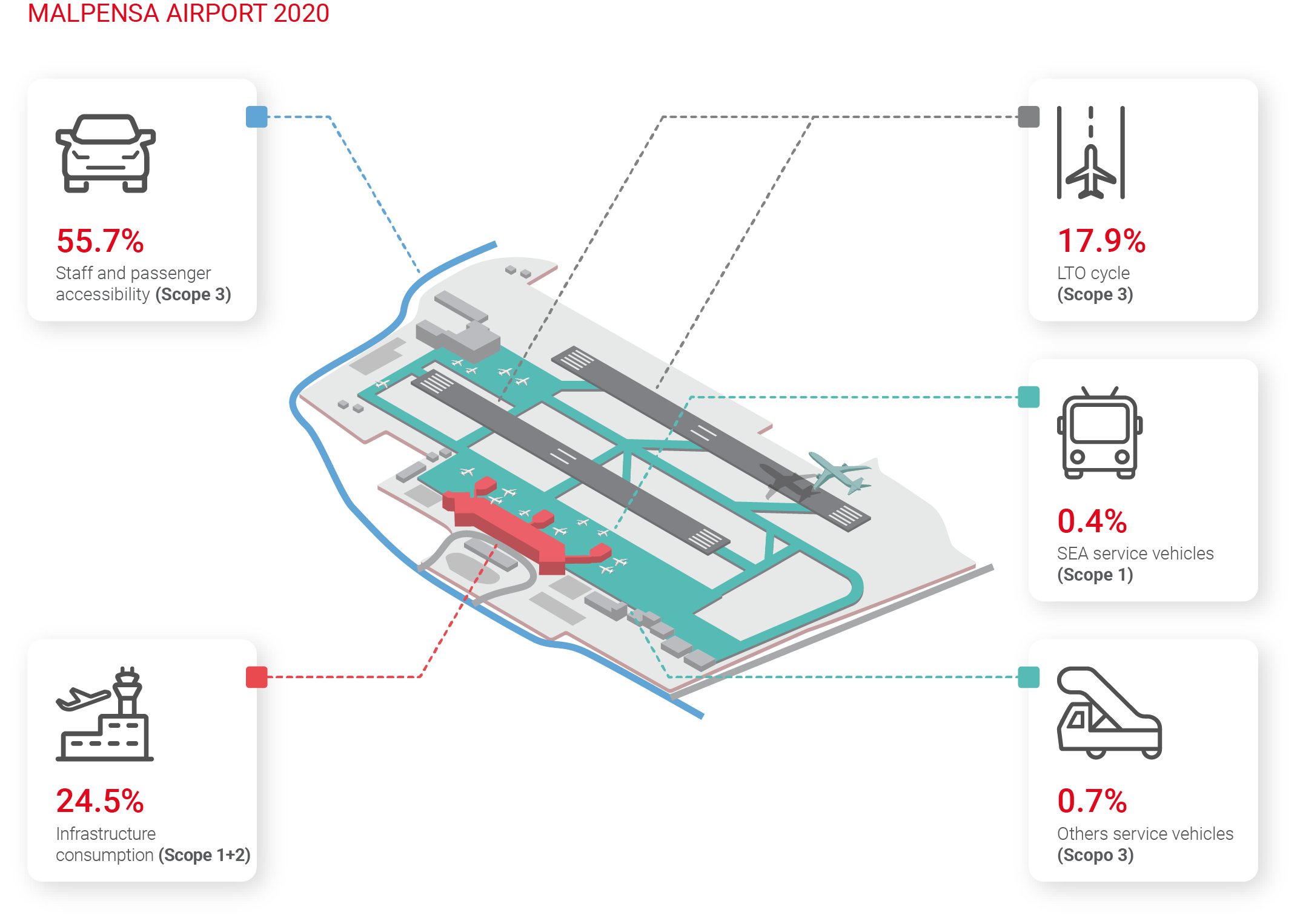
Development of recycling at Linate and Malpensa
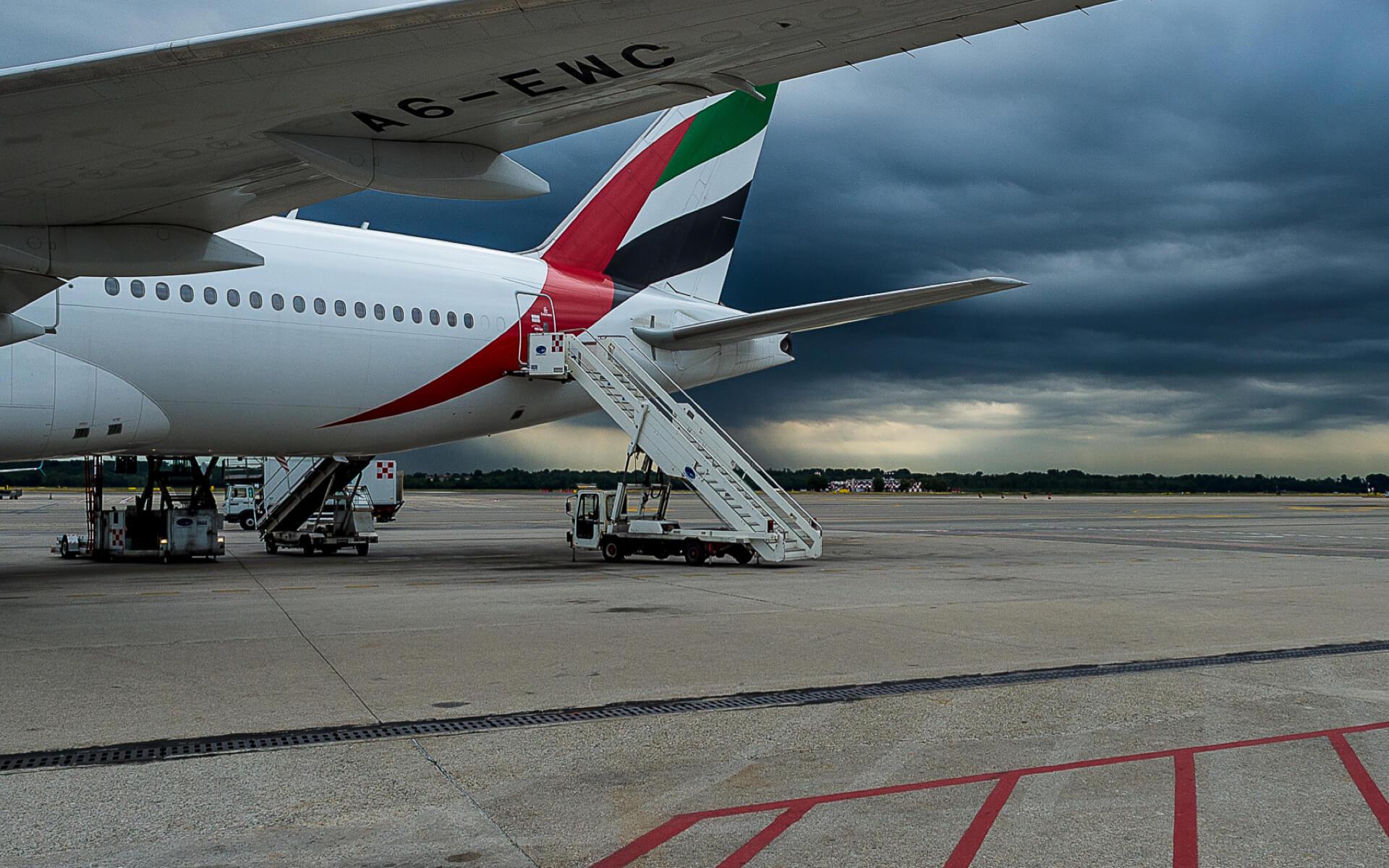
Milan
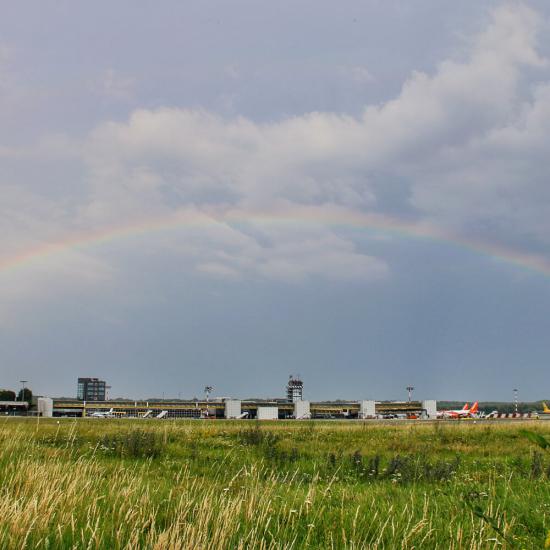
COMMUNITY
Local involvement
Our Malpensa and Linate airports involve the local area. Even during the pandemic, we focused on the community to generate shared opportunities and growth.
The role of the Milanese airport system in Europe and the world
The role of the Milanese airport system in Europe and the world
- 2nd in Italy and 9th in Europe for air passenger traffic.
- 1st in Italy and 5th in Europe for air cargo traffic.
- Malpensa is the reference hub for the delivery and distribution of anti-Covid-19 equipment.
- One of the 140 airports worldwide to achieve “Voice of the Customer” recognition for demonstrating significant customer communication efforts during the pandemic.
Malpensa’s catalytic impact
- 19.6 thousand jobs generated in Lombardy
- +9.7% of cargo transported in 2020 (vs. 2019)
In 2020, Malpensa Cargo City continued to have a major impact on Made in Italy exports, especially in the furniture, chemical, fashion and mechanical sectors.
Export value shares for some industrial sectors via Malpensa (Euro millions)
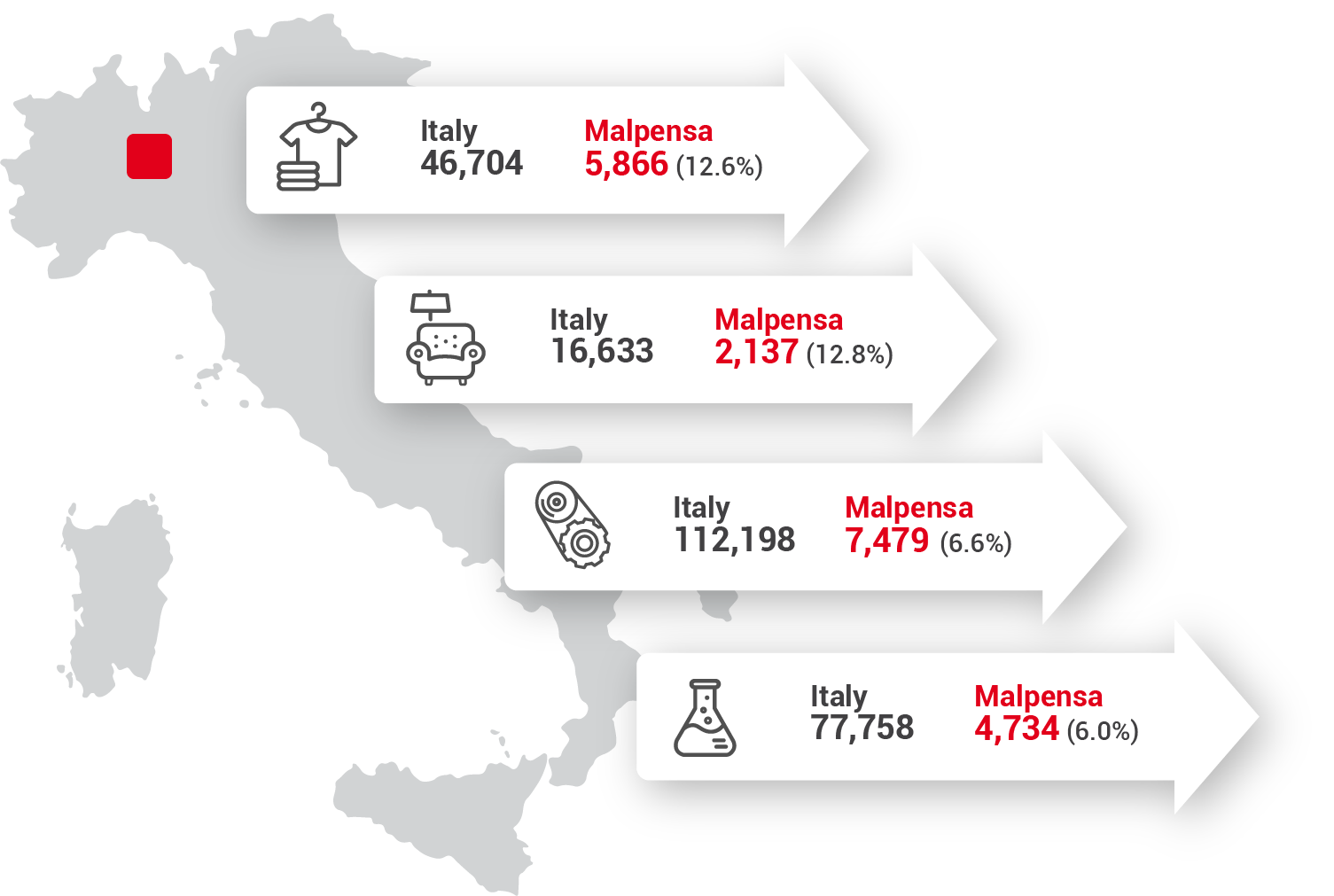
Recognition
2021 Sustainability Leader
We are one of the 150 Italian companies selected as “2021 Sustainability Leaders” – following the evaluation by business newspaper Il Sole 24 Ore and Statista, a German company among the most authoritative business platforms in the world – out of around 1500 companies operating in Italy.
